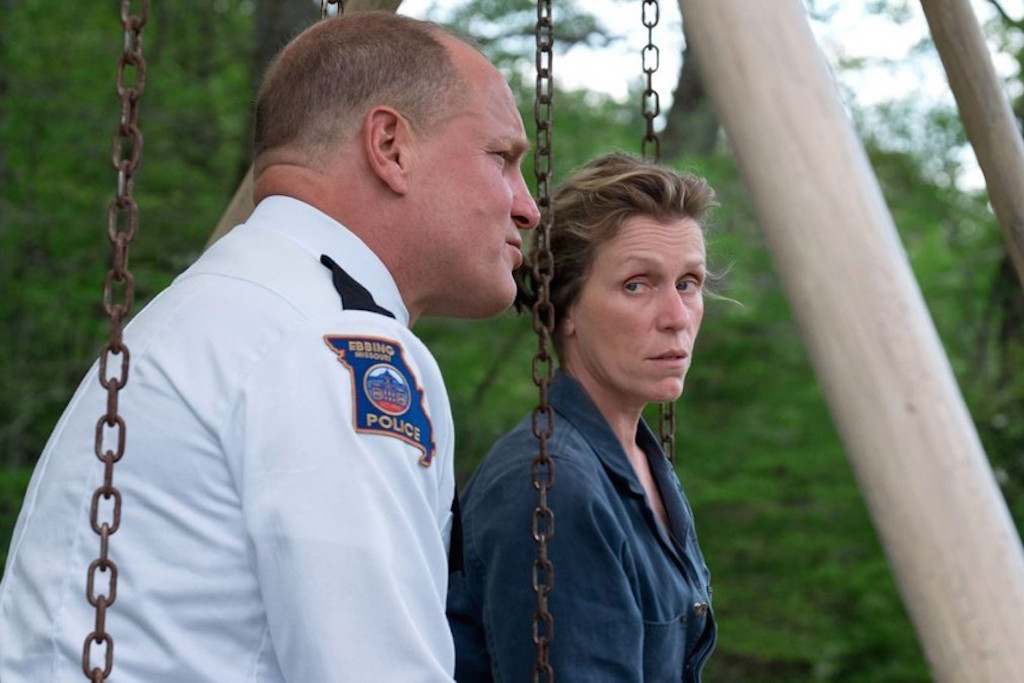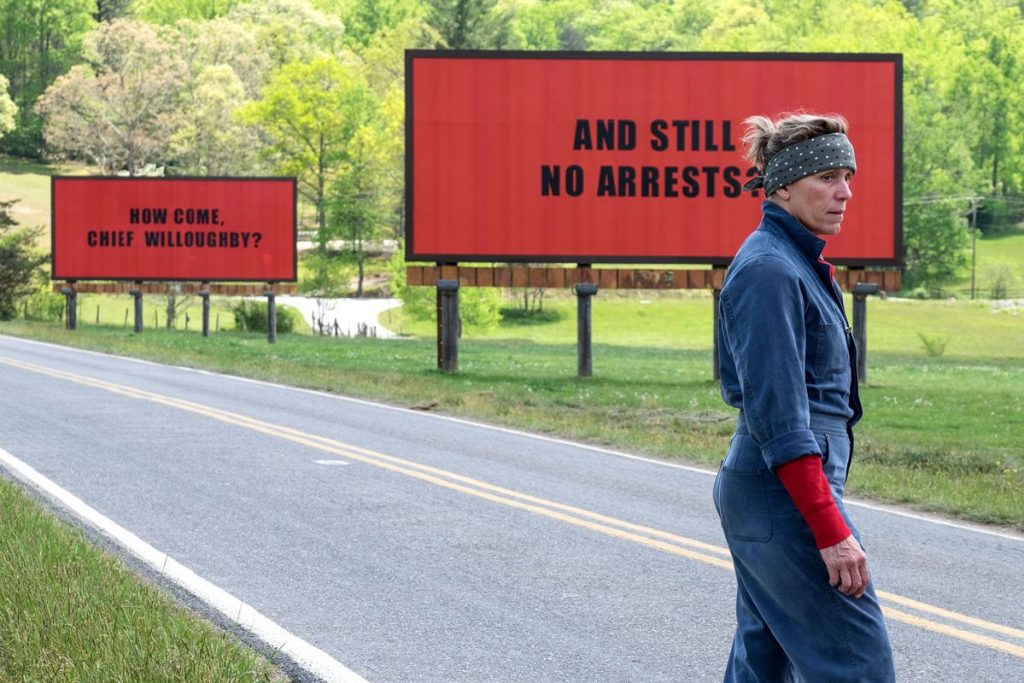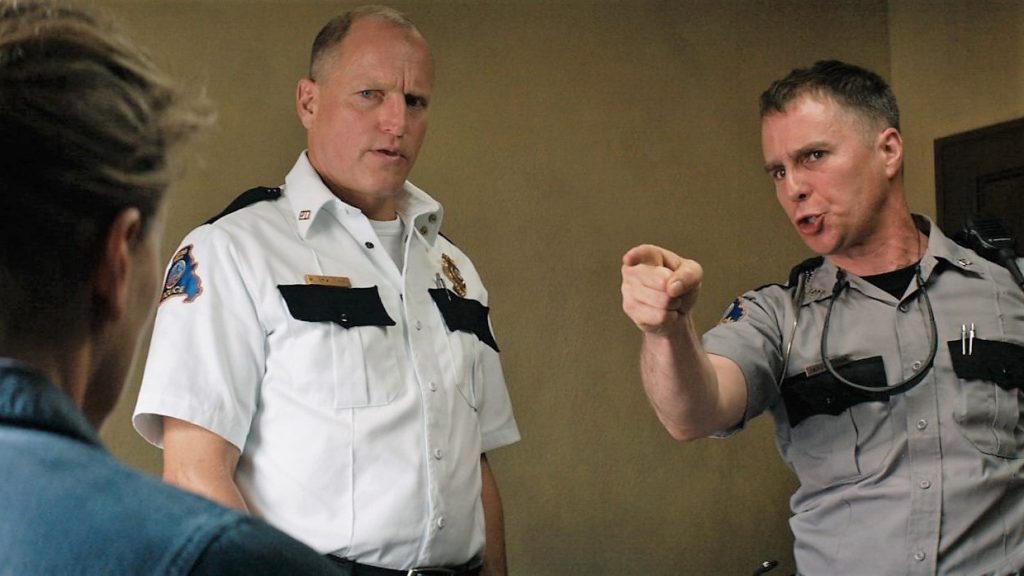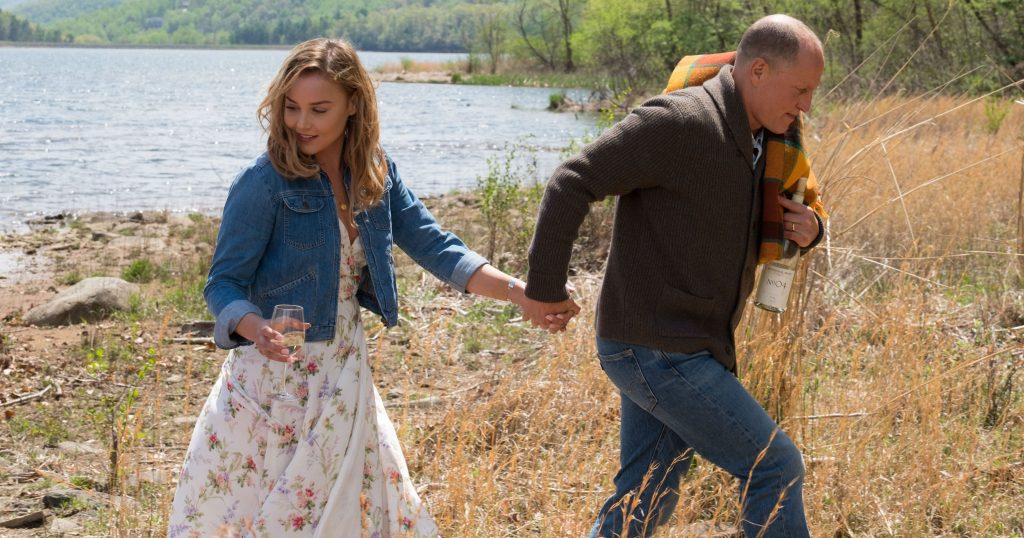Is ‘Three Billboards’ Actually Any Good, or Just Oscar Bait?
Should we believe the Oscars hype?

Is it still possible to come in cold to a movie? Save for the opening day diehards, most of us sit down in the cinema with a tangle of preconceptions. Often it’s hard to remember where they came from: a New York Times headline, maybe, or your cousin’s Facebook rant. And no trip to the movies in 2018 has been more susceptible to outside influence than Three Billboards Outside Ebbing, Missouri.
Despite its emphatic 93 percent from critics on Rotten Tomatoes, Three Billboards is far from a consensus hit. The latest movie from UK playwright-turned-director Martin McDonagh now has the blowback to match its early acclaim. As Three Billboards became an awards season favourite, the arguments from both sides only got louder.
The movie is up for seven Academy Awards this year, including Best Picture, Best Actress for Frances McDormand and Best Original Screenplay for McDonagh. It’s in illustrious company with this year’s Best Picture nominees. In addition to proven masters like Paul Thomas Anderson and Guillermo del Toro, the category has rightly anointed Jordan Peele (Get Out) and Greta Gerwig (Ladybird) as Oscar-worthy filmmakers.
So does Three Billboards deserve its spot? Well, as you might’ve heard, it’s complicated.
And The Oscar Goes To…
Frances McDormand, by far the movie’s best asset, holds the screen from the first minutes. We watch as her car slows on a deserted road alongside three beat-up billboards. She sits, silently chewing a nail, a plan forming on her face. It’s the kind of engrossing opening that says you’re in good hands. (Later you might wish the movie stayed in this quiet, contemplative mood.)
McDormand plays Mildred Hayes, a no-shit-taking resident of the (fictional) Missouri town Ebbing. Months have passed since her teenage daughter Angela was raped and murdered, and Mildred is furious at the stalled investigation. So she takes those billboards out of retirement with a message to Ebbing’s police chief William Willoughby (Woody Harrelson). After Mildred’s had her way, they read in sequence: “RAPED WHILE DYING”, “AND STILL NO ARRESTS?” and “HOW COME, CHIEF WILLOUGHBY?” From there all manner of small town tumult ensues, delivered by the heavy hand of its writer-director.

McDormand is the movie’s hard-bitten centre, and it’s always a pleasure to see her — even slumming it in Transformers: Dark of the Moon. McDormand’s best allies behind the camera remain Joel and Ethan Coen, who’ve deployed her humour and humanity in the likes of Blood Simple, Raising Arizona and The Man Who Wasn’t There. (Joel also happens to be her husband of 30-plus years.)
Marge Gunderson, McDormand’s kind-but-steely cop in the Coen brothers masterpiece Fargo, would be a worthy foil to Mildred Hayes. The protagonist of Three Billboards is a verbal bomb thrower in blue overalls and bandana, always ready with an acidic line. Scabrous, sweary Frances McDormand is worth the ticket price alone, but this is not her most rounded role. Still, if Three Billboards is worthy of a win in any Oscars category, Best Actress is probably it.
Coming To America
Martin McDonagh is not your archetypal Best Picture filmmaker. On the example of his past movies, In Bruges and Seven Psychopaths, he has more in common with Shane Black than Steven Spielberg. Black, the writer-director of punchy black comedies Kiss Kiss Bang Bang and The Nice Guys, probably isn’t angling for the Academy’s attention. (His next project is a Predator movie, so definitely not.) But he and McDonagh share a fondness for male anti-heroes, fuck-filled dialogue and violence played for laughs. There’s also something alike in the unflashy, functional way they shoot a scene.
However, unlike McDonagh’s last two larks, Three Billboards has Big Things to say about America. Its problems have a lot to do with the director’s natural instincts butting up against the pose of a prestige movie. Without the white-hot Frances McDormand as its star, the centre would not hold.

Much of the Three Billboards criticism has focused on Sam Rockwell’s character, the racist cop Jason Dixon. Rockwell plays Dixon as a volatile idiot, governed by a hair-trigger temper and his embittered Momma (Sandy Martin). Rockwell pulls off a tricky performance, and it’s likely to win him an Oscar for Best Supporting Actor. The debate over Dixon’s redemption arc — we learn early that he tortured a black man in his custody, without apparent consequence — is a valid one.
But much of the movie’s hot-button-mashing on race feels unearned. It’s one thing to introduce police violence against black citizens in your movie, but the main story should at least grapple with it. Instead it’s a sideline prop to Mildred’s scorched earth mission. This renders the movie’s black characters — like new cop in town Abercrombie (Clarke Peters) and Mildred’s co-worker Denise (Amanda Warren) — oddly inconsequential. In Bruges gave us gags about Americans as “fuckin’ elephants” and smoking section killjoys. Three Billboards has McDonagh reaching for deeper barbs, but his own movie gets in the way.
But Wait, There’s More…
Racist cop redemption aside, Three Billboards has other problems. For all of McDormand’s naturalistic heft, the movie around her feels stagey and calculated. There are numerous flat notes, including Abbie Cornish’s distracting performance as Chief Willoughby’s maybe-Australian wife Anne and an underused Peter Dinklage as James, the butt of several “town midget” jokes.

A perfectly suited couple with no discernible age gap
A scene in which Mildred’s abusive ex-husband Charlie (John Hawkes) visits her house is typical of the movie’s falsity: the characters interact like they know they’re onstage. And while McDonagh’s dialogue is expertly nasty — this isn’t the kind of movie where everyone in the cinema laughs at the same lines — it always feels like dialogue. Finally, for as much as Three Billboards is about the trauma of violence, there’s a near-cartoonish relish to the kicked groins, punched faces, burned body parts…and one very unlucky fingernail.
Given the acting talent involved and its patina of timeliness, it’s perhaps not surprising Three Billboards won the Academy’s approval. But Oscars don’t guarantee a movie ages well. A few years from now, there mightn’t be much left to see in the town of Ebbing, Missouri.
—
Jack Tregoning is a freelance writer based in New York. He is on Twitter.